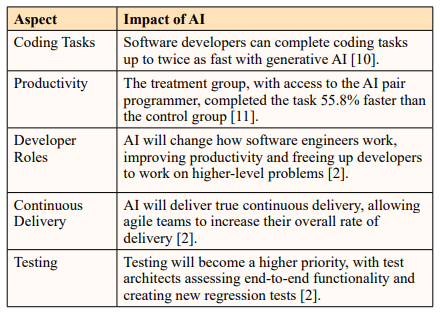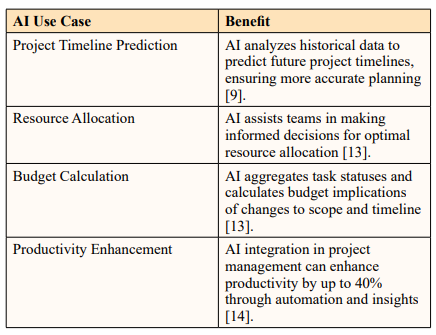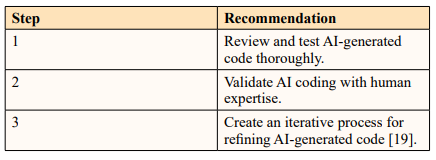Author(s): Sudheer Peddineni Kalava
Artificial intelligence (AI) is revolutionizing the world of software development, transforming the way developers create, test, and deploy applications [1]. AI for software development encompasses a wide range of tools and techniques that leverage machine learning algorithms to automate common operations, provide feedback on failed tests, validate application dependencies, and enforce best practices [1]. From automated code analysis and testing frameworks to predictive analytics and natural language processing, AI is making software development more accessible and efficient than ever before [1].
As the demand for AI in software development continues to grow, with the market expected to expand by 37.3% from 2023 to 2030, it's crucial for developers to understand how AI can enhance their workflows and productivity [2]. This article will explore the impact of AI on developer workflows, evaluate the best AI tools for developer productivity, and provide recommendations for effectively integrating AI into software development processes. By leveraging AI coding assistants and other powerful development tools, software engineers can streamline their work, improve code quality, and deliver innovative solutions faster than ever before [3].
Understanding the Impact of AI on Developer Workflows AI is revolutionizing the software development lifecycle (SDLC) by automating manual and repetitive tasks, such as code generation, reviews, testing, and debugging, allowing developers to focus on more complex, unique, and creative tasks [4]. This automation can significantly reduce time and costs in the SDLC, enabling developers to concentrate on strategic and creative endeavors [5].
AI has the potential to supercharge creativity by suggesting alternative algorithms, recommending relevant code snippets, and generating entire sections of code based on specifications [5]. Moreover, AI can enhance collaboration by bridging the gap between developers and other stakeholders, such as designers and product managers, and facilitating real-time feedback loops [5].
AI can assist security teams by automating the analysis of code for software vulnerabilities and potential unintended threats [4]. Additionally, AI can help influence low-code SDKs by:
Furthermore, AI can identify potential security vulnerabilities, performance issues, and bugs in code, allowing for continuous improvement [4].
AI tools like ChatGPT or Claude.ai are being integrated into various business processes, including sales and content creation, potentially impacting the roles and responsibilities of developers [6]. AI coding assistants can help developers:
AI is changing the game by redefining traditional coding practices, simplifying complexities, and making coding more efficient and streamlined [9]. The impact of AI on efficiency and productivity is transformative, automating mundane tasks and providing valuable insights for software developers [9].

AI is more about augmentation rather than replacement, automating routine tasks and providing developers with tools to focus on complex problem-solving and strategic tasks [2]. While AI will require training and continual oversight, the increased productivity will be worth it [4].
AI-powered tools are revolutionizing the software development landscape, offering developers a wide range of solutions to enhance productivity and streamline workflows. From code generation and completion to error detection and refactoring, these tools leverage machine learning algorithms to assist developers at every stage of the development process.
AI-powered tools like DeepCode and SonarQube can detect potential errors before they escalate into larger issues [9]. These tools use machine learning to perform comprehensive code reviews, identifying potential bugs and security vulnerabilities [9].

AI tools like Sourcery provide automated refactoring suggestions, significantly reducing the time and effort developers invest in these tasks [9]. Additionally, tools such as Mintlify enable continuous documentation of projects, setting up automations and rules to ensure easy writing, tracking, and management of documentation [12].
By leveraging these AI-powered tools, developers can write code faster, identify and resolve issues more efficiently, and maintain comprehensive documentation, ultimately leading to improved productivity and code quality [8,9].
The Benefits of AI Integration in Development Processes The integration of AI in software development processes offers numerous benefits that revolutionize the way developers work and the quality of the final product. AI coding assistants can significantly reduce time-to-market, provide cost savings through automation, and increase accessibility for non-experts [8]. As projects grow in complexity, AI tools offer scalability and continuous improvement in suggestions and insights [8].
AI algorithms analyze historical project data to predict future project timelines, resource requirements, and potential risks, enabling more accurate planning and decision-making [9]. AI- enhanced project management tools assist teams in making the right decisions for resource allocation, improving the accuracy of project planning and monitoring [13]. By automating repetitive tasks and providing comprehensive insights, AI can enhance productivity in project management by up to 40% [14].

AI generates test cases based on code changes, reducing the time taken for manual test case creation [9]. Automated testing tools powered by AI algorithms can detect anomalies, offer insights for test optimization, and improve efficiency by up to 50% [15,16]. AI tools can also simulate realistic testing conditions, prioritize test runs based on the likelihood of containing bugs, and ensure comprehensive coverage [16].
AI plays a crucial role in every stage of product development, from conceptualization to market analysis, driving innovation and ensuring products meet evolving market demands [15]. By providing accurate predictions and insights, AI enables developers to make informed decisions about optimizing software for the user, creating a more personalized and satisfying user experience [18].
The integration of AI in software development is not just a trend but a revolution that transforms the way developers work and the quality of the final product [15]. By automating repetitive tasks, providing real-time suggestions, and optimizing processes, AI reduces time and costs involved in software development while achieving higher accuracy and efficiency [13,18]. As AI continues to evolve, its impact on the software development landscape will only grow, making it an essential tool for developers seeking to stay competitive and deliver cutting-edge solutions.
Navigating the Challenges of AI in Software Development When integrating AI-powered tools into software development workflows, organizations must navigate various challenges to ensure successful adoption and mitigate potential risks. Gradual integration of AI tools is recommended, starting with one tool and monitoring its impact before incorporating more [9]. This approach allows teams to assess the effectiveness of AI solutions and make necessary adjustments along the way.
One of the primary concerns when using AI in software development is data security and privacy. AI tools often need to access and analyze large amounts of data, which could potentially include sensitive information [2]. To address this challenge, organizations should:
Organizations must weigh their ethical and social obligations when adopting AI models [2]. This includes considering:
While AI tools offer significant benefits, it's essential to recognize that the best work produced by AI still has human fingerprints on it [2]. Embracing the collaboration between AI and human developers is key to successful AI integration. Team training is essential to fully exploit AI tools' capabilities, and developers should anticipate challenges such as initial resistance or difficulties in learning new tools [9].

By addressing these challenges head-on and implementing appropriate mitigation strategies, organizations can successfully navigate the integration of AI in software development and reap the benefits of enhanced productivity, efficiency, and innovation.
Recommendations for Effective Use of AI Coding Assistants When integrating AI coding assistants into your development workflow, it's essential to follow best practices to maximize their potential and ensure optimal results. Consider these recommendations for effectively leveraging AI tools like Cody, which requires an internet connection to function and performs LLM inference and co-generation remotely for optimal performance [7].

By following these recommendations and best practices, you can effectively integrate AI coding assistants into your development workflow, harnessing their potential to boost productivity, improve code quality, and accelerate innovation [8].
As the software development landscape continues to evolve, the integration of AI-powered tools and techniques is becoming increasingly crucial for developers to stay competitive and deliver cutting-edge solutions. By leveraging AI coding assistants, automated testing frameworks, and intelligent project management tools, developers can significantly enhance their productivity, streamline workflows, and improve the overall quality of their code. However, to fully capitalize on the benefits of AI in software development, organizations must navigate challenges such as data security, ethical considerations, and the need for effective collaboration between human developers and AI tools [20,21].
By following best practices and recommendations for integrating AI coding assistants, such as maintaining oversight, documenting AI usage, and creating specific prompts, developers can harness the power of AI while mitigating potential risks. As AI continues to advance and transform the software development landscape, embracing its capabilities and adapting to new ways of working will be essential for developers to thrive in an increasingly AI- driven world [22].
